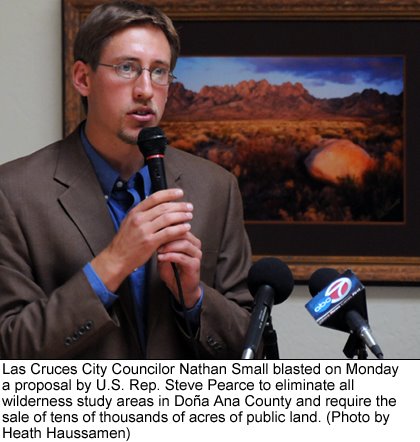
 U.S. Rep. Steve Pearce introduced a bill last week that would eliminate all wilderness study areas in
U.S. Rep. Steve Pearce introduced a bill last week that would eliminate all wilderness study areas in
At issue is what to do with hundreds of thousands of acres of federal land around
The group formed two years ago in opposition to the New Mexico Wilderness Alliance’s proposal to give a permanent wilderness designation — the highest level of protection — to more than 300,000 acres of land in the county. The Wilderness Alliance plan has widespread support from local governments and newspapers.
The ranching group called Pearce’s bill “innovative land-protection legislation” in a news release. Pearce’s bill would leave
“We are gratified that Congressman Steve Pearce has recognized our efforts of the past two years by introducing this legislation,” said the ranching coalition’s president, Tom Cooper. “Congressman Pearce remains steadfast in his efforts to meet the desires and expectations of the citizens of the 2nd Congressional District and the state. We greatly appreciate his efforts, and we applaud him for his consistently strong stand to protect the property rights and the heritage of all Americans.”
The Wilderness Alliance, meanwhile, held a news conference on Monday to blast Pearce’s proposal.
“This is an assault on
Las Cruces City Councilor Nathan Small, an employee of the Wilderness Alliance, called Pearce’s bill “an attack on our public lands.”
The chances for the Republican congressman’s proposal may be dim in a Democratic-controlled House. Jude McCartin, spokeswoman for U.S. Sen. Jeff Bingaman, D-N.M., said the bill “will not be considered by the Senate, and it would be very surprising if the House considered it.” She said Bingaman does not support Pearce’s legislation “in large part because it weakens current public-land protections in areas that include the
A spokeswoman for U.S. Sen. Pete Domenici, R-N.M., said the senator had no comment on Pearce’s legislation. Pearce’s office had no immediate comment but said a news release will be forthcoming.
New land designations
Pearce’s bill would eliminate the eight wilderness study areas in the county — comprising about 220,000 acres — and instead designate “special preservation areas” and “rangeland preservation areas” to give some protection to approximately 300,000 acres, including the Organ, Doña Ana and Robledo mountains and
Grazing is also allowed in wilderness areas. So is motorized- and mechanical-vehicle access under a handful of exceptions to the
In addition, they claim that Pearce’s legislation might allow more roads and off-road vehicle use than a wilderness designation. Many proponents of the ranchers’ plan say wilderness designations are too restrictive and advocate for greater vehicle access to public lands.
Wilderness study areas are managed by the Bureau of Land Management until Congress and the president take action to designate them as permanent wilderness areas or release them for other purposes. The charge to the BLM is to preserve the lands until their status is resolved, and while some have the full protections granted to wilderness areas, off-road vehicle use that is not allowed in wilderness areas is allowed in some wilderness study areas.
Land disposal
Pearce’s legislation would also require the disposal of federal land in the county that the BLM identifies as available for disposal. That’s currently about 65,000 acres — an area twice the size of
That board is another aspect of Pearce’s legislation that was blasted at Monday’s Wilderness Alliance news conference. Several said the board is counter to the principles of open government.
Cathy Mathews, president of the League of Women Voters of Greater Las Cruces, said the sale of public land needs more public discussion and input, not decisions made following the advice of a small group of local representatives of special-interest groups. Pearce’s bill does require the state BLM director to “establish procedures to provide Federal, State, and local governments and the public with adequate notice of, and an opportunity to comment on, the priorities for the disposal of public land… including through the conduct of public hearings as the State Director determines to be appropriate.”
No consensus
The current fight over the fate of federal land in
Bingaman and Domenici have largely stayed on the sidelines during the debate, saying the community must reach consensus before they’ll act.
The Wilderness Alliance plan is backed by a well-organized group of area residents who believed the city was growing too rapidly and without adequate planning and overthrew the city council several months ago, electing candidates who advocated for more public involvement and moderated growth. Some 200 of those citizens packed the
City Councilor Small pointed out at the news conference that Domenici supported the creation of a wilderness area in the
